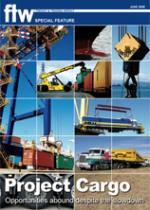It is heading towards being a more
professional and specialised industry,
according to Swanepoel. “It is also
going to be strictly controlled and
managed by the road traffic act (RTA)
and regulations - in conjunction
with a new TRH11. And these new
guidelines should see the light of
day within the next few months.”
A major part of its battle for
survival has been with government
and provincial authorities, who,
according to Swanepoel, have added
tedious limitations on the operators’
business freedom.
“Due to the many restrictions,”
he said, “this industry has been
involved in numerous head-on
collisions with the DoT and the
provinces for the relaxation of
specific issues such as: Weekend
travel, minimising of embargo days,
and optimisation of equipment to the
maximum capacity.”
It has also had to prove itself
willing to government to be able to
look after its own affairs.
Many of the role players in the
industry have been jacking up their
operations to improve equipment
and to clean up their act, according
to Swanepoel.
“Through this,” he added, “the
industry would like to show the
DoT that it is willing to participate
in the process to improve its internal
standards - hoping that this will
facilitate the negotiations around
the table to relax the issues which
concern us.
Where is the abnormal industry heading?
15 Jun 2009 - by Alan Peat
0 Comments
Project Cargo 2009

15 Jun 2009
15 Jun 2009
15 Jun 2009
15 Jun 2009
15 Jun 2009
15 Jun 2009
15 Jun 2009
15 Jun 2009
15 Jun 2009
Border Beat
16 Apr 2025
